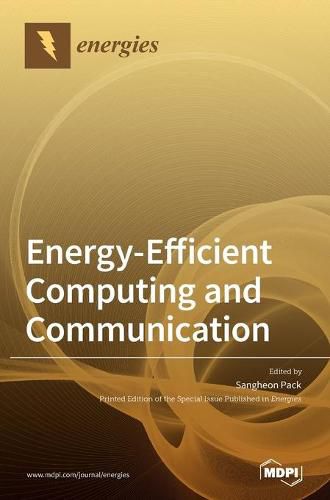Readings Newsletter
Become a Readings Member to make your shopping experience even easier.
Sign in or sign up for free!
You’re not far away from qualifying for FREE standard shipping within Australia
You’ve qualified for FREE standard shipping within Australia
The cart is loading…






This title is printed to order. This book may have been self-published. If so, we cannot guarantee the quality of the content. In the main most books will have gone through the editing process however some may not. We therefore suggest that you be aware of this before ordering this book. If in doubt check either the author or publisher’s details as we are unable to accept any returns unless they are faulty. Please contact us if you have any questions.
Information and communication technology (ICT) is reponsible for up to 10% of world power consumption. In particular, communications and computing systems are indispensable elements in ICT; thus, determining how to improve the energy efficiency in communications and computing systems has become one of the most important issues for realizing green ICT. Even though a number of studies have been conducted, most of them focused on one aspect-either communications or computing systems. However, salient features in communications and computing systems should be jointly considered, and novel holistic approaches across communications and computing systems are strongly required to implement energy-efficient systems. In addition, emerging systems, such as energy-harvesting IoT devices, cyber-physical systems (CPSs), autonomous vehicles (AVs), and unmanned aerial vehicles (UAVs), require new approaches to satisfy their strict energy consumption requirements in mission-critical situations. The goal of this Special Issue is to disseminate the recent advances in energy-efficient communications and computing systems. Review and survey papers on these topics are welcome. Potential topics include, but are not limited to, the following: - energy-efficient communications: from physical layer to application layer; - energy-efficient computing systems; - energy-efficient network architecture: through SDN/NFV/network slicing; - energy-efficient system design; - energy-efficient Internet of Things (IoT) and Industrial IoT (IIoT); - energy-efficient edge/fog/cloud computing; - new approaches for energy-efficient computing and communications (e.g., AI/ML and data-driven approaches); - new performance metrics on energy efficiency in emerging systems; - energy harvesting and simultaneous wireless information and power transfer (SWIPT); - smart grid and vehicle-to-grid (V2G); and - standardization and open source activities for energy efficient systems.
$9.00 standard shipping within Australia
FREE standard shipping within Australia for orders over $100.00
Express & International shipping calculated at checkout
This title is printed to order. This book may have been self-published. If so, we cannot guarantee the quality of the content. In the main most books will have gone through the editing process however some may not. We therefore suggest that you be aware of this before ordering this book. If in doubt check either the author or publisher’s details as we are unable to accept any returns unless they are faulty. Please contact us if you have any questions.
Information and communication technology (ICT) is reponsible for up to 10% of world power consumption. In particular, communications and computing systems are indispensable elements in ICT; thus, determining how to improve the energy efficiency in communications and computing systems has become one of the most important issues for realizing green ICT. Even though a number of studies have been conducted, most of them focused on one aspect-either communications or computing systems. However, salient features in communications and computing systems should be jointly considered, and novel holistic approaches across communications and computing systems are strongly required to implement energy-efficient systems. In addition, emerging systems, such as energy-harvesting IoT devices, cyber-physical systems (CPSs), autonomous vehicles (AVs), and unmanned aerial vehicles (UAVs), require new approaches to satisfy their strict energy consumption requirements in mission-critical situations. The goal of this Special Issue is to disseminate the recent advances in energy-efficient communications and computing systems. Review and survey papers on these topics are welcome. Potential topics include, but are not limited to, the following: - energy-efficient communications: from physical layer to application layer; - energy-efficient computing systems; - energy-efficient network architecture: through SDN/NFV/network slicing; - energy-efficient system design; - energy-efficient Internet of Things (IoT) and Industrial IoT (IIoT); - energy-efficient edge/fog/cloud computing; - new approaches for energy-efficient computing and communications (e.g., AI/ML and data-driven approaches); - new performance metrics on energy efficiency in emerging systems; - energy harvesting and simultaneous wireless information and power transfer (SWIPT); - smart grid and vehicle-to-grid (V2G); and - standardization and open source activities for energy efficient systems.